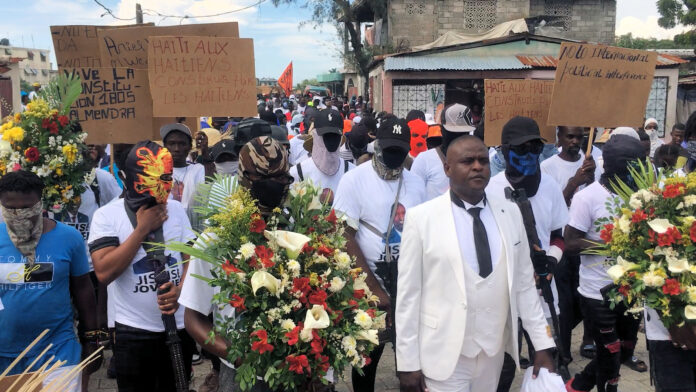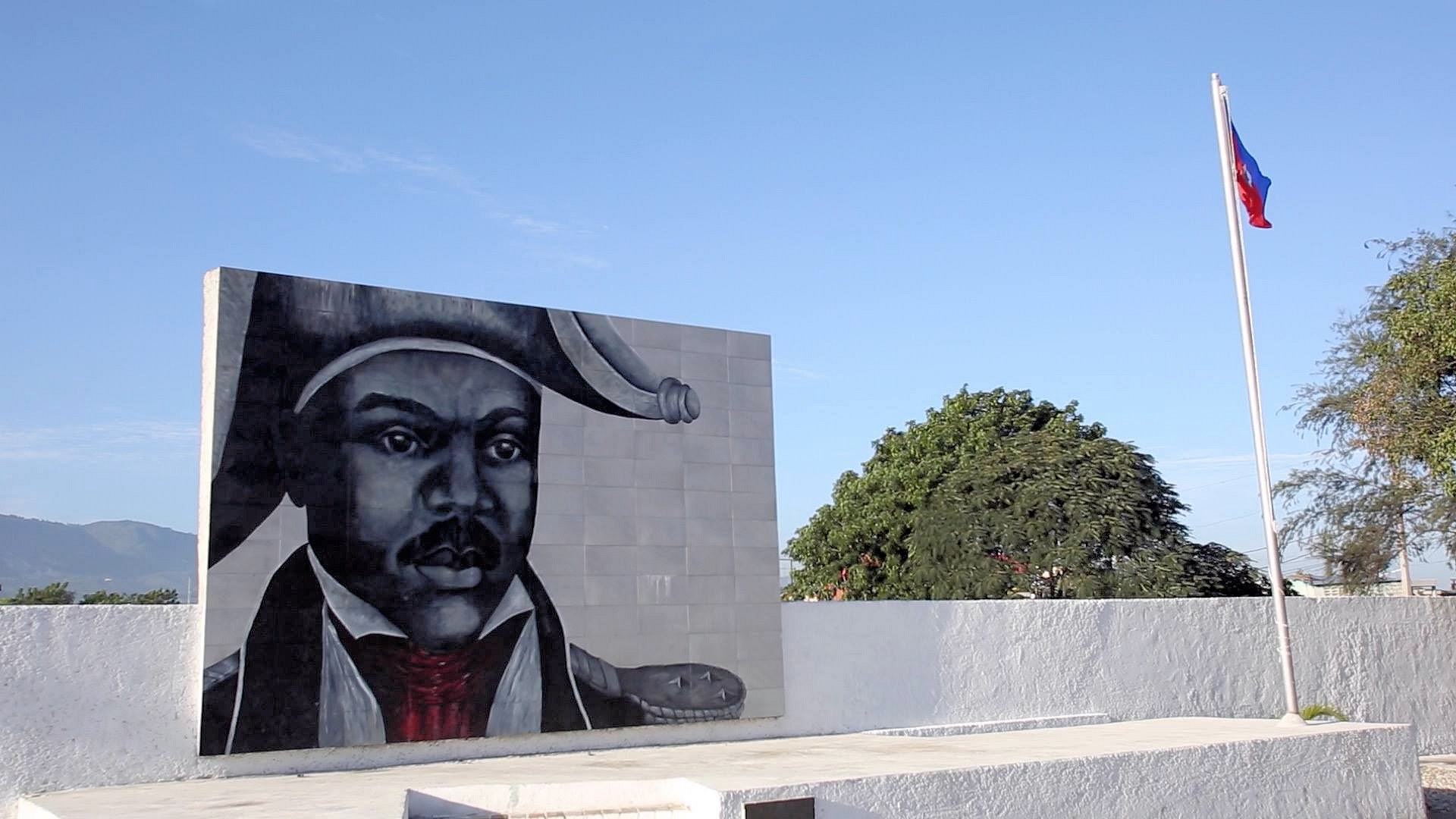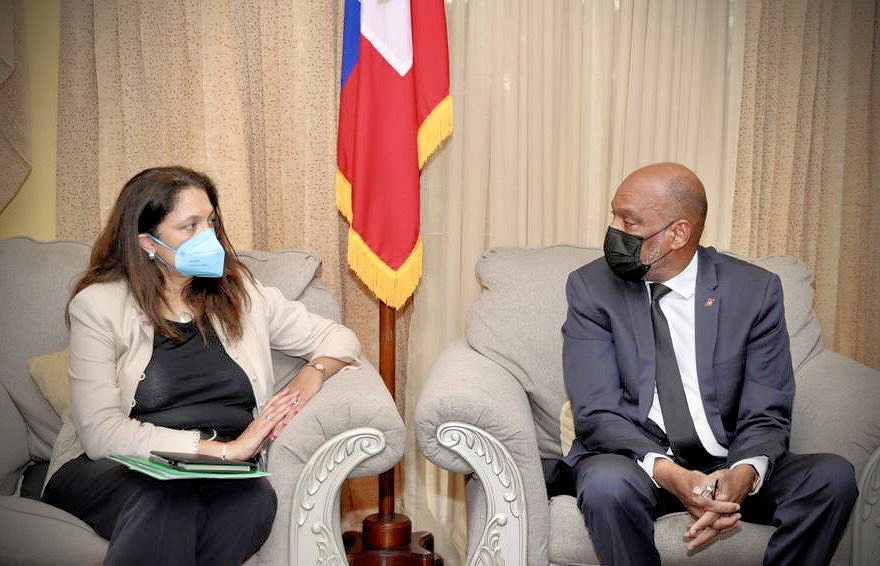
(Français)
Sun., Oct. 17th did not begin well for Haiti’s Prime Minister Ariel Henry. He was supposed to place a wreath of flowers on the monument marking the approximate site, in Port-au-Prince’s Pont Rouge neighborhood, where Haiti’s founding father Jean-Jacques Dessalines was ambushed and assassinated 215 years ago.
Police chief Léon Charles assembled a heavily armed escort of dozens of policemen from Haiti’s most elite units – BOID, UDMO, BLTS – to deploy around the Aviation Intersection near the monument early in the morning. But as they entered the area, they were surrounded by the crackle of gunfire. The impressive retinue of muscled officers and suited government officials in SUVs swiftly turned around and fled. (Henry’s cortege later tried to hold a ceremony at the Musée du Panthéon National Haïtien or MUPANAH near the National Palace, but it was closed. They did it at the nearby Hôtel de la Patrie. He also went to lay a wreath in the Artibonite Valley town of Marchand Dessalines, Haiti’s first capital.)
It was just the latest demonstration of how powerless and rejected Henry’s government is, especially as suspicion mounts about his involvement in the Jul. 7 assassination of President Jovenel Moïse.

A few hours later, dressed (as tradition dictates) in a brand-new white suit with the store stickers still on the sleeve, Jimmy “Barbecue” Cherizier, the leader and spokesman of the “Revolutionary Forces of the G9 Family and Allies, Mess with One, You Mess with All” (FRG9), an alliance of armed neighborhood groups, strode confidently through Pont Rouge and down Avenue Jean-Jacques Dessalines with a crowd of hundreds to the monument, where he laid a wreath and gave a speech.
“The strength of the FRG9 is our unity,” Cherizier told Lavi Info. “The FRG9’s greatest strength is our determination to struggle against a stinking, corrupt system of which Ariel Henry and Léon Charles are a part. Not to boast, but I don’t think we deployed even 20% of our strength today. But in the coming days, we will deploy our forces, because Ariel Henry must resign to be judged” for his possible role in Moïse’s assassination.
The day before, the 400 Mawozo gang based in the region just east of the capital kidnapped 17 missionaries: 16 U.S. citizens, including five children, and one Canadian. The missionaries from the Ohio-based Christian Aid Ministries were captured in the small, dusty town of Ganthier on Route 8, which runs from the capital to the Dominican border town of Jimani. The gang is asking for $17 million, or $1 million per hostage, their typical ransom request.
Last April, Wilson’s men kidnapped 10 Catholics: five priests, two nuns, and three family members of a priest. They were released for an unknown ransom paid by the Catholic Church. The gang had asked for $1 million.
Washington’s grip on running Haiti’s affairs is slipping.
400 Mawozo, headed by Joseph Wilson, known as “Lanmò Sanjou” (Death without Day), is one of the FRG9’s bitterest enemies. Wilson has sent soldiers to join forces with gangs of Belair, Ruelle Mayard, Rue Tiremasse, and Cité Soleil’s Jean Pierre Gabriel in bloody attacks on FRG9-controlled neighborhoods, particularly Cherizier’s lower Delmas neighborhoods of Delmas 2, 4, and 6.
The FBI has sent agents to assist the U.S. State Department and Haitian authorities in finding out where the hostages have been taken and negotiating their release.
But the abduction has renewed calls for U.S. military intervention from the Washington Post, which clamored for troops to be sent after Moïse’s assassination, although Haitians almost universally reject such a move.
“We can no longer ignore Haiti’s descent into chaos,” an Oct. 19 editorial is headlined, arguing that “outside intervention could … establish a modicum of stability and order that would represent a major humanitarian improvement on the status quo.”
“In the cost-benefit analysis that would attend any fresh intervention, policymakers must be alert to the risks, but also to the enormous peril of continuing to do nothing,” the editorial concludes.
The call for military action was echoed by Rep. Adam Kinzinger (R-IL), who sits on the House Foreign Affairs Committee. “We need to track down where they are and see if negotiations – without paying ransom – are possible,” he said on a TV news show. “Or do whatever we need to do, on a military front or a police front.”
But Washington’s grip on running Haiti’s affairs is slipping. Since it engineered the overthrow of President Jean-Bertrand Aristide on Feb. 2004, it has championed United Nation’s missions to Haiti to oversee the country. For 15 years, those missions were armed occupations – MINUSTAH and MINUJUSTH – deployed under Chapter 7 of the UN Charter. But since 2019, Haiti has been under the Chapter 6, or “advisory,” supervision of the Integrated Office of the UN in Haiti or BINUH, headed by long-time U.S. State Department official Helen La Lime.
BINUH’s mandate ran out on Fri., Oct. 15 and needed to be renewed that day in the UN Security Council. Normally, this is an almost pro-forma vote, where the U.S. rather easily gets the one-year extension it asks for. But this year was different.

China opposed the BINUH’s one-year renewal, proposing instead one of six-months. The BINUH’s mandate extension offered “an opportunity to discuss how to help Haiti more effectively,” and “Haiti cannot achieve stability without self-reliance,” China argued.
The stand-off between the two veto-wielding powers continued for several hours until a last-minute compromise was reached at 6 p.m. to extend BINUH’s mandate for only nine months.
The issue of the renegade Chinese province of Taiwan was surely also at play. Haiti is one of only 14 nations worldwide who recognize Taiwan as a sovereign nation, and only five of them have a population of over two million.
At the same time, the Biden administration has not walked back any of the Trump administration’s aggressive moves regarding Taiwan, such as selling the island $2.2 billion of advanced weaponry and allowing brazen diplomatic stopovers in the U.S. by Taiwan’s President Tsai Ing-wen.
the FRG9’s call for Henry’s resignation is gaining traction in the population
Instead, the U.S. put a thumb in China’s eye this month by leaking that it had deployed U.S. Special Forces and Marines in Taiwan for “at least a year,” according to the Wall Street Journal.
Meanwhile, the U.S. State Department seems to be in disarray and having a hard time deciding which of two rival “civil society” and political party coalitions to back in Haiti. Each has a different road-map of how to arrive at elections to reconstruct the collapsed Haitian state, which has only 10 elected officials, all Senators. Its Special Envoy to Haiti, Daniel Foote, resigned in disgust at U.S. policy in September, and State Department officials Uzra Zeya, Brian A. Nichols, and Juan Sebastian Gonzales have all visited Haiti this month to meet with Ariel Henry, Léon Charles, and the two coalitions.
But the FRG9’s call for Henry’s resignation is gaining traction in the population, and its alliance threatens to fill the government void before Washington can. In the crowd that marched to the Dessalines monument, there were signs that read “No to Foreign Political Interference” and “Haiti to Haitians, Built by Haitians.”
“Barbecue should talk to the armed groups and make a call to the young for Barbecue to make a revolution to save Haiti from these dirty worthless scoundrels,” said one older man at an Oct. 18 demonstration outside the headquarters of the cellphone company Digicel, which just dramatically hiked the rates on its digital cash transfers. “Barbecue’s group is not a gang, in my opinion. He’s a guy who has weapons in hand and a lot of friends.”









